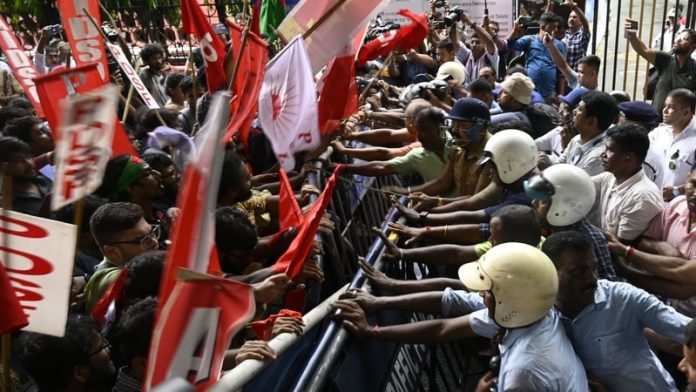Bangladesh Prime Minister Sheikh Hasina blamed her political opponents for the recent outbreak of deadly violence that gripped the country during recent student protests against quotas for government jobs and said on Monday that curfews would be lifted as soon as the situation improved.
The prime minister’s comments came a day after the South Asian country’s top court agreed to overturn most quotas in its ruling on Sunday, following days of clashes between protesters and security forces that forced the government to shut down internet services, impose curfews and deploy the army.
The protesters were demanding the cancellation of a quota system that allocates government jobs between relatives of veterans of the 1971 independence war. In Bangladesh, 56 per cent of public sector jobs are allocated to certain groups. 30 per cent are reserved for families of the 1971 War of Independence veterans, 10 per cent for women, 10 per cent for people from backward areas, 5 per cent for local communities and 1 per cent for the disabled. The quotas for families of war veterans were cancelled in 2018 following student protests across the country.
However, the Supreme Court ruled last month to reinstate the quota system, leading to fresh protests. Muhalifa students are demanding the cancellation of quotas for families of war veterans, believing it is “discrimination” and demanding a merit-based system. In a country where much of the population remains below the poverty line, civil service is often the only chance to escape poverty.
Opposition guilt
Hasina, 76, won a fourth consecutive term in January in national elections that were boycotted by the main opposition party. She said while addressing business leaders in the capital Dhaka:
“When the arson terrorist attack started, protesting students said they had no involvement. We were forced to impose curfew to protect the lives and property of citizens. I never wanted this. We will lift the curfew as soon as the situation improves.”
Hasina blamed the main opposition Bangladesh Nationalist Party and the Jamaat-e-Islami Party and its student wing for the violence that began last week.
The parties did not immediately respond to a request for comment, but critics, including the BNP, have previously accused Hasina of authoritarianism, human rights abuses and cracking down on free speech and dissent – allegations her government denies.
The streets of Dhaka looked calm on Monday, a day after the Supreme Court ruled in favour of the government’s appeal against a lower court order and ordered that 93% of government jobs should be opened to candidates on merit.
The ruling reduced quotas for government jobs previously reserved for groups including families of freedom fighters, women and so-called disadvantaged groups to 7 per cent from 56 per cent.
Experts blame the unrest on stagnant job growth in the private sector and high youth unemployment, which has made government jobs, with their regular pay rises and other perks, more attractive.
More than 1,000 arrested in Bangladesh
Protests against job quotas in Bangladesh have led to widespread unrest that has led to about 1,200 arrests and at least 174 deaths, according to a separate AFP tally of casualties reported by police and hospitals.
The authorities’ response to the protests has been widely criticised, with Bangladeshi Nobel Peace Prize winner Muhammad Yunus calling in a statement for “world leaders and the United Nations to do everything in their power to end the violence.”
The respected 83-year-old economist is credited with lifting millions out of poverty through his pioneering microfinance bank, but he earned the hostility of Hasina, who accused him of “sucking the blood” of the poor. Yunus told AFP:
Every day young people are killed at random. Hospitals are not disclosing the number of injured and dead.
Diplomats in Dhaka have also questioned the government’s actions, with US Ambassador Peter Haas telling the foreign minister that he was shown a one-sided video at a briefing for diplomats.
Government officials have repeatedly blamed protesters and the opposition for the unrest.
At least 200 people were arrested during the unrest in the central districts of Narayanganj and Narsingdi, police chiefs in those districts told AFP, while at least 80 people were detained in Bogra.
At least 168 people were arrested in the industrial city of Gazipur, 75 in the northern city of Rangpur and 60 in Barisal in the south, senior police officials said. Eighty people were arrested in rural and industrial parts of Dhaka, in addition to an earlier figure of 532 in the capital, bringing the total number of arrests to 1,195.
